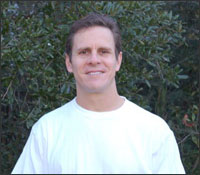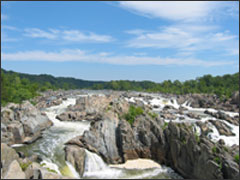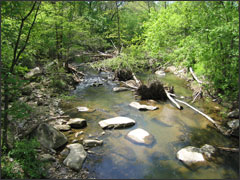Eight students will be presenting the summer work at the Ocean Sciences Meeting in March 2022!
Career Spotlight - Jim Hagy (1990)

What is your current job?
I am a research ecologist with the US Environmental Protection Agency's Office of Research and Development (ORD). ORD conducts research to support the regulatory and other environmental management missions of EPA. We also contribute broadly to the scientific fields in which we work. I work on the effects of anthropogenic nutrient enrichment on the Nation's estuaries and coastal waters, particularly in the Gulf of Mexico Region. My research presently supports 2 main areas. One is reducing the size of an area of low bottom water oxygen levels in the northern Gulf of Mexico that results from nutrients flowing from the Mississippi-Atchafalaya River Basin into the Gulf. The other is development of water quality standards for nutrients in estuaries.
What is a typical day like for you? Do you use any special tools or equipment?
I spend most of my days in an office setting. I analyze and visualize environmental data using data management, scientific computing, statistical, and graphics software like SAS, Microsoft Access, MATLAB, ArcGIS, and SigmaPlot. I spend a lot of time writing, reading, and otherwise communicating with colleagues. Occasionally, I work in the laboratory. During a year, I have spent anywhere from one week up to several months working in ships or boats with my research team. I use field equipment specially designed to measure physical, chemical and optical properties of seawater as well as equipment that measures water levels and current velocity.
What do you like most about your job?
My work provides an almost insurmountable intellectual challenge. At the same time, there are many opportunities to feel that one is worthy and can make a valuable contribution to the field, even if you can't learn all you'd like to. That's one great thing. Like many scientists, I am always surprised and excited to find natural order in the data that I collect.

What do you like least about your job?
Sometimes I feel like weeks will pass and I won't have accomplished anything of note. Working in a government agency, there seems to be a lot of distractions, including calls to take on new work before completing old work. This challenge of "staying focused," however, probably plagues all scientists to some degree, regardless of where they work.
How can I do what you do? What classes do I need to take?
One of the best young scientists I know majored in comparative religion in college, so undergraduate coursework can vary, but for most people wanting a career in environmental science, I'd recommend an undergraduate major in the natural sciences. Good coursework in mathematics and strong computer skills are also important. Subsequently, a Ph.D. degree is usually needed, with a research focus that will at least get you started. After that, your research and interests can continue to evolve. The most important thing is to get exposed to a real research setting through a job or work-study opportunity. An internship opportunity is a great way - probably the best way - to see how science really works. I spent the summer at Horn Point Laboratory as part of the Maryland Sea Grant Research Experiences for Undergraduates Program. Effectively, that experience launched my career.
Where are the hot spots for this kind of field?
There are a lot of places that do important work in my field, in part because there is need for different types of research and research that addresses the unique ecological situations that arise in different parts of the world. EPA's Office of Research and Development aspires to be a leading institution for providing that unique mixture of basic and applied research products and decision tools that are needed to meet the environmental management mission. I like to think we are a "hot spot" in our area. We have capable peers in Europe and Australia and ideally we will all learn from each other.

What still inspires you about your work?
We are at a crossroads, in my view, where we have to decide as a nation what kind of environment we are going to leave to our children. Scientists in my field have been pointing to the fundamental problem of eutrophication for decades and even though our knowledge has grown more and more detailed, examples of recovery resulting from management actions are few. What inspires me is that I see momentum starting to grow in the direction of taking action, and I see a huge need for the appropriate and timely scientific information and tools to guide decision making.
What is the salary range for your type of position?
Salaries of Federal scientists are determined by the Federal Government's "General Schedule" or "GS." Scientists with my training (Ph.D.) in my type of position typically start at GS-11 or GS-12 and may progress through GS-15. Salary in these grades varies geographically, but is approximately $55,000 increasing to over $100,000 per year.


